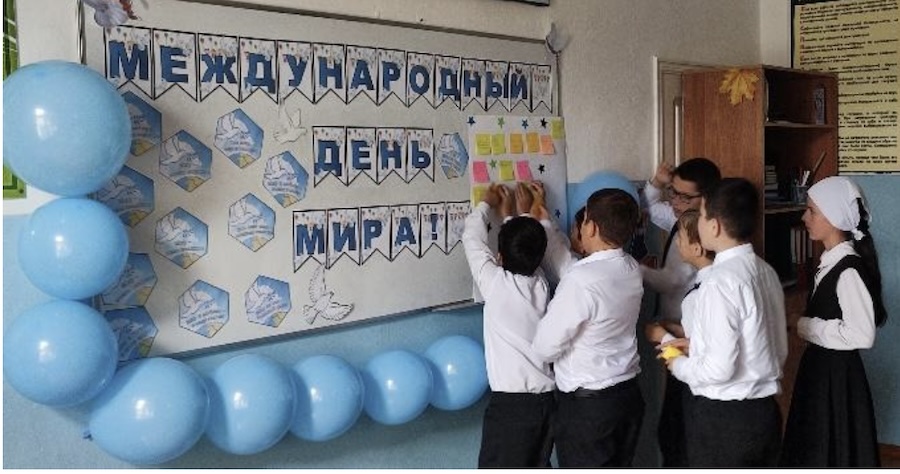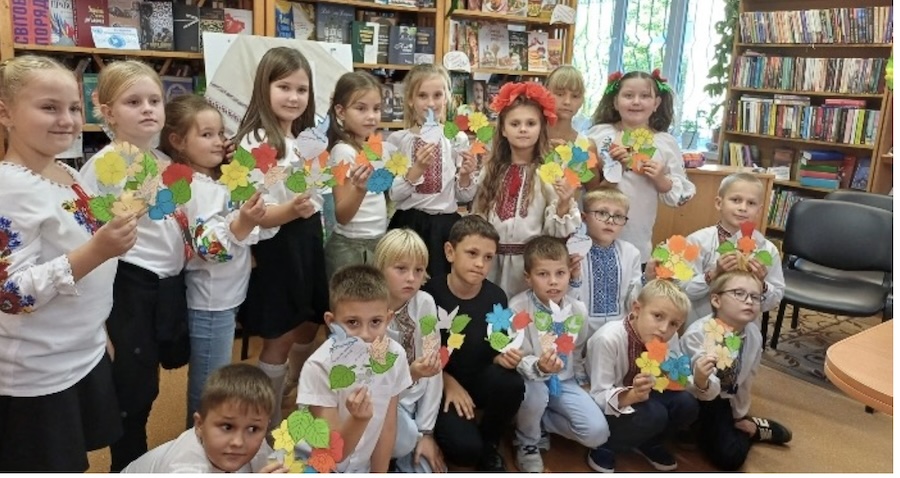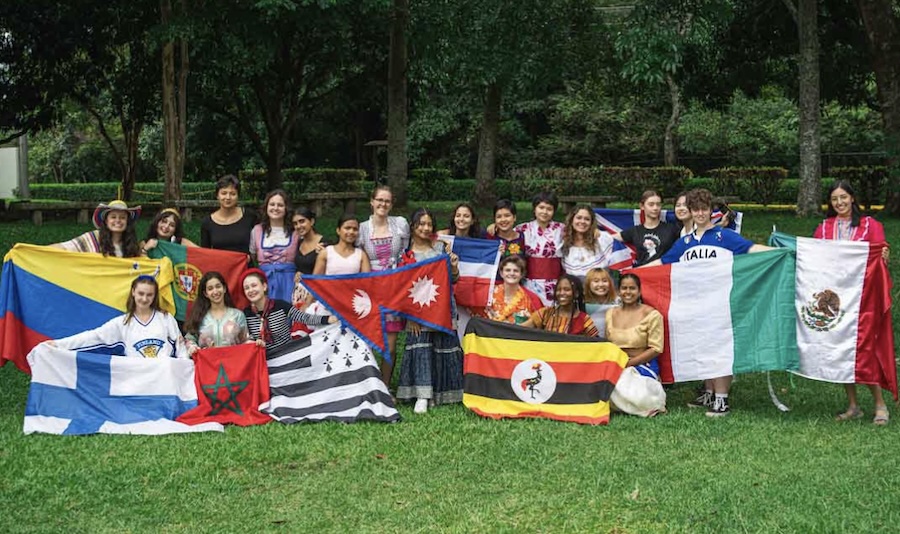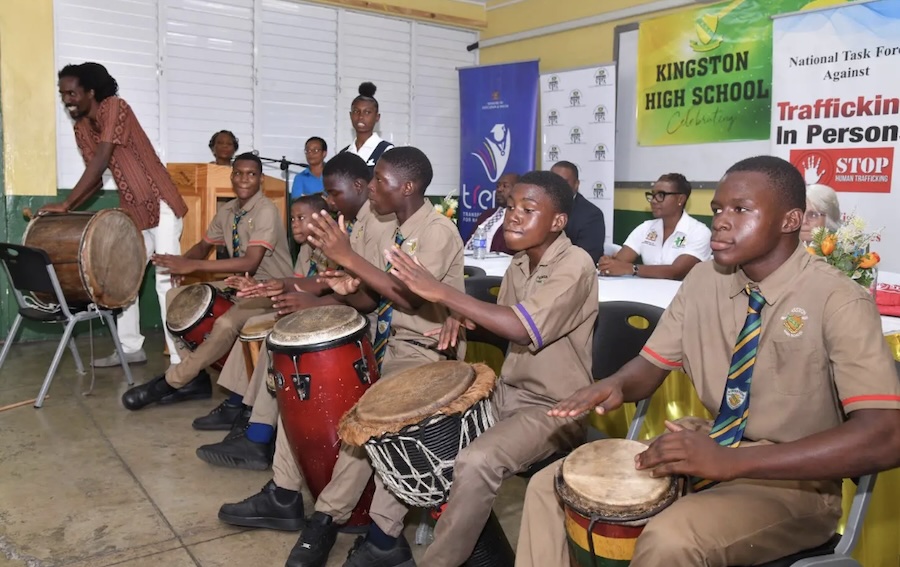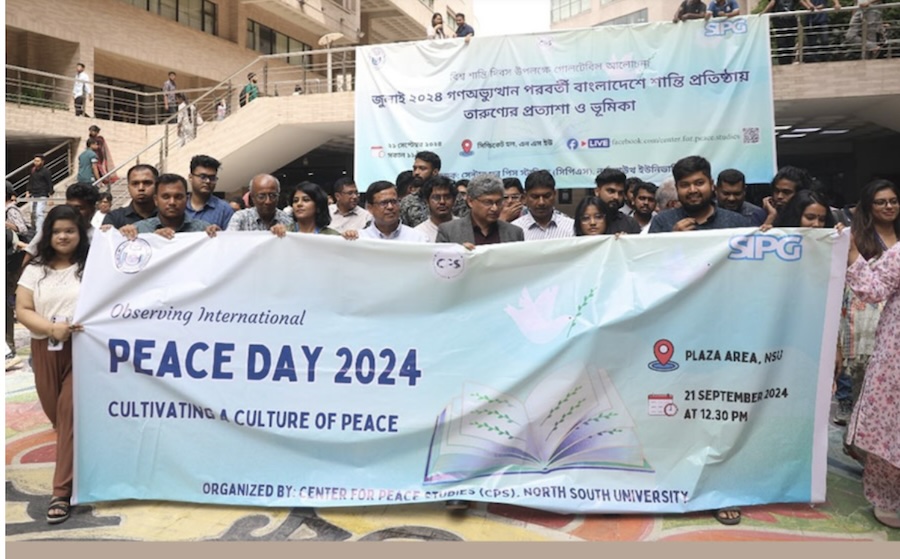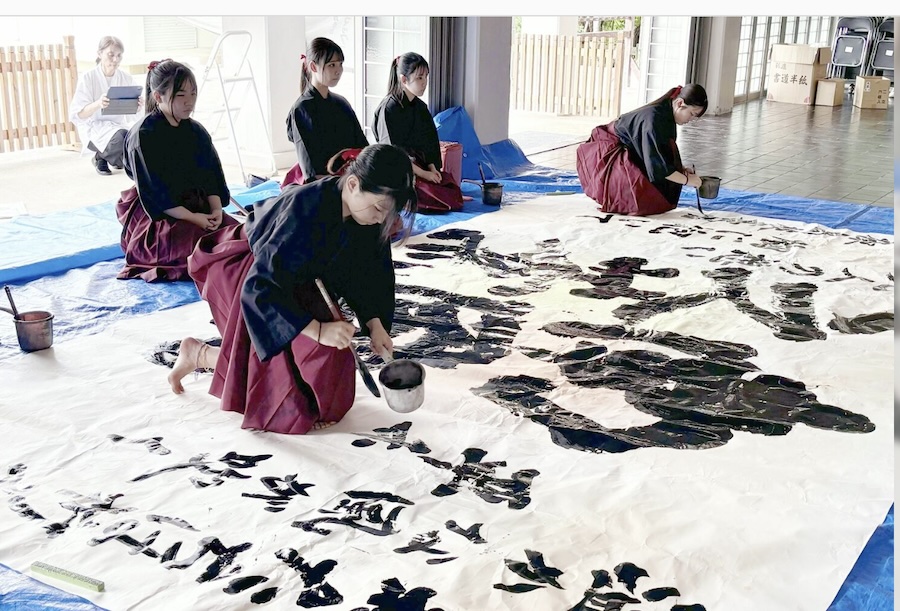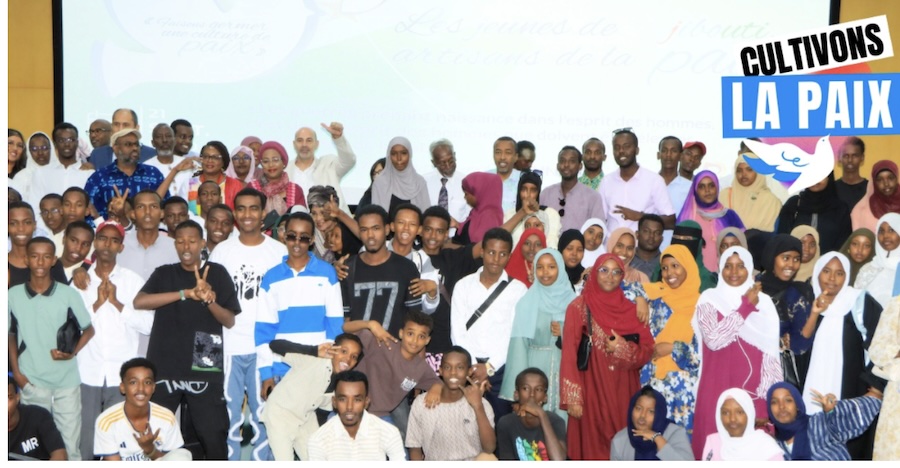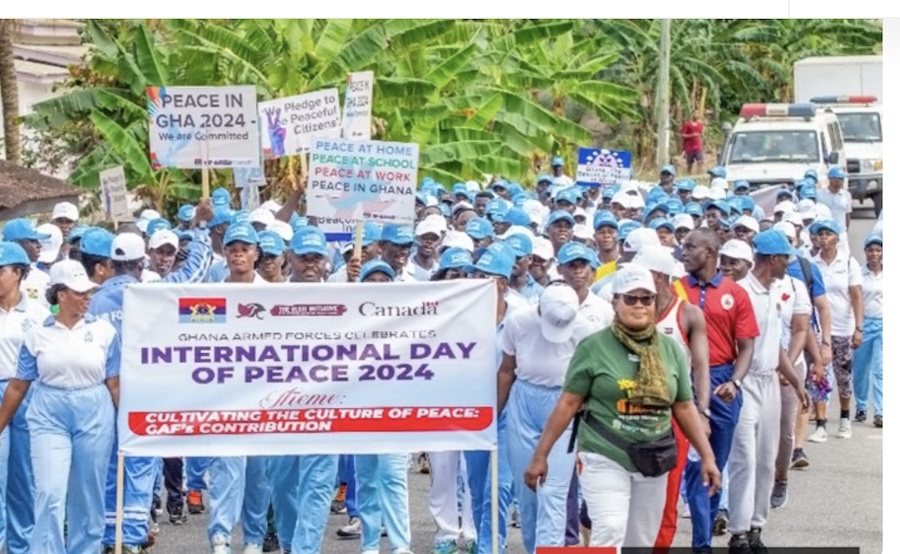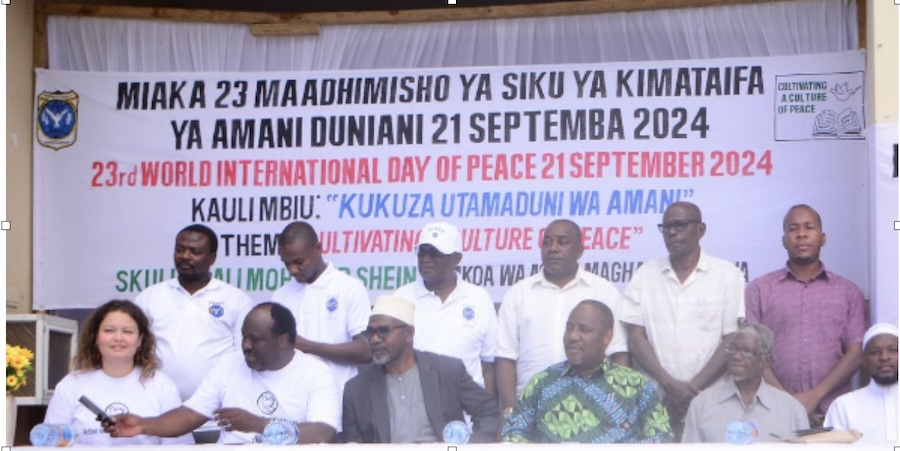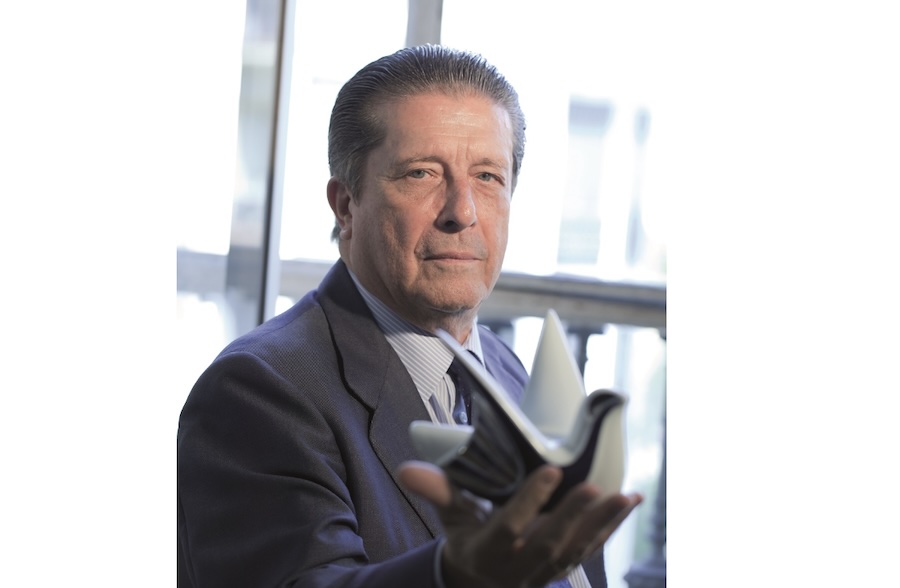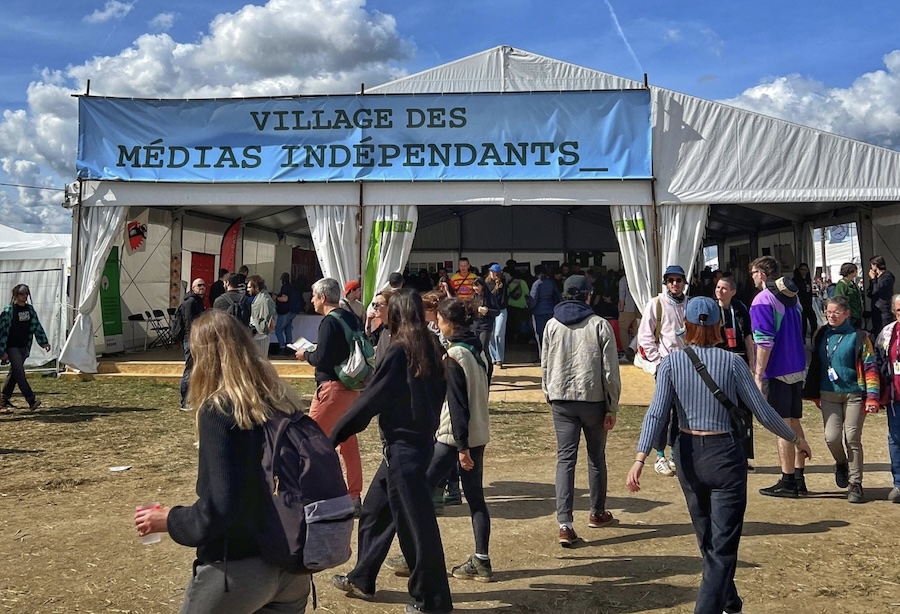FREE FLOW OF INFORMATION .
A survey by CPNN
Here are 151 actions for the International Day of Peace located in 44 of the 50 United States, as well as 15 events in Canada in 6 provinces. In order to save space, only one event is given in detail for each state of the USA while internet links are provided for the others.
The events were listed in Google during the weeks of September 17-28 this year under the key words “International Day of Peace,” “peaceday” or “Journée Internationale de la Paix” or were listed on the website of Campaign Nonviolence.
Unlike last year when 107 new events were registered for Montessori schools singing for peace, this year the Montessori website no longer provides a list.
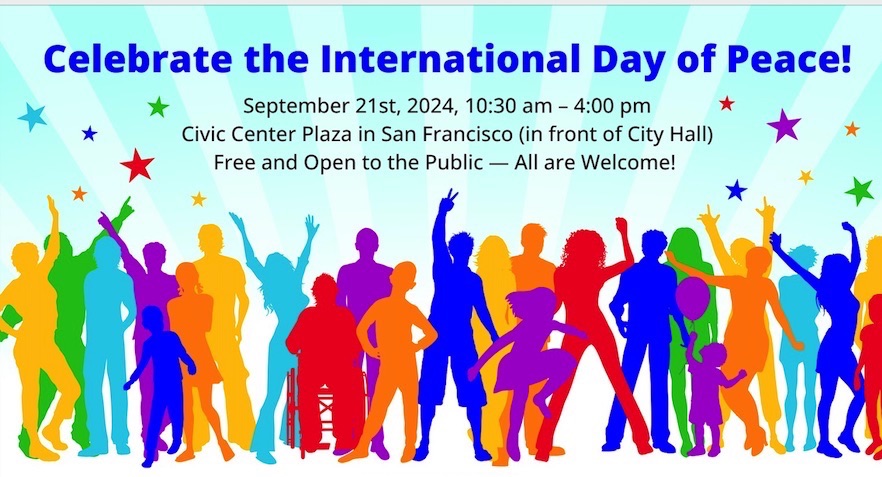
SAN FRANCISCO
Here are excerpts from the articles.
STATEMENT BY THE PRIME MINISTER: The Prime Minister, Justin Trudeau, today issued the following statement on the International Day of Peace: “Today, on the International Day of Peace, we reflect on the progress made and move forward on the work yet to be done to achieve a more inclusive, peaceful, and secure world for everyone. As geopolitical crises become increasingly complex, the principles outlined in the United Nations (UN) Universal Declaration of Human Rights and the UN Sustainable Development Goals are more relevant than ever – and Canada is stepping up to strengthen them.
“Through our Feminist International Assistance Policy, we are actively supporting inclusive peacekeeping efforts around the world. This includes ongoing efforts to advance gender equality in peace and security through the Women and Peace and Security Agenda and support the meaningful participation of women in UN peacekeeping operations through the Elsie Initiative. We are also strengthening the protection of civilians through the Vancouver Principles, which prevent the recruitment and use of child soldiers by armed forces and armed groups.
“This week, as the UN General Assembly begins in New York City, let’s recommit ourselves to working together to build a better, safer, and more peaceful world.”
ALBERTA
RED DEER: Join the Central Alberta Multifaith Network for Compassion and Peace and Red Deer Polytechnic on Saturday, September 21st to recognize the UN International Day of Peace. Our Keynote Speaker is Lewis Cardinal whose topic is “The Role of Religions, Faiths, and Spiritual Traditions in Global Reconciliation”. Lewis will be followed by a panel discussion with panelists from different religions/perspectives (including Baha’i, Buddhist, Humanist and more) about how peace shows up in scripture and practice in various religions/beliefs.
BRITISH COLUMBIA
DAWSON CREEK: The City of Dawson Creek council proclaimed Saturday, September 21st, as the International Day of Peace. The proclamation was made during council’s September 9th meeting.
THREE RIVERS: Thompson Rivers University. Connect with the Multi-Faith Chaplaincy on Thursday, Sept. 19, 11 a.m. to 1 p.m. for International Day of Peace. Various chaplains will be at the Campus Courts outside of Old Main for reflection, connection and conversation.
MANITOBA
DECLARATION OF PROVINCE OF MANITOBA: Peace Days from 10 to 21 September 2024. Click link above to see full declaration.
NOVA SCOTIA
HALIFAX: In a powerful demonstration of unity and commitment to global peace, a diverse group of 20 peace advocates will walk 200 kilometers. The Walking Together for Peace walk left Pagweak/Pugwash on September 8, and walking to Kjipuktuk/Halifax, Nova Scotia and arriving on the International Day of Peace, September 21, 2024. The walk draws inspiration from the Pugwash Conference of 1957, where scientists agreed on dismantling nuclear weapons at the height of the Cold War.
ONTARIO
BANCROFT: Bancroft council has declared Sept. 21 as Peace Day in the Town of Bancroft. The CN Tower and Niagara Falls have both agreed to our request to illuminate on Peace Day. The CN Tower will be lit in rainbow colors to symbolize peace. The lighting will begin at sunset, becoming fully visible approximately 30 minutes later as the sky darkens. A standard light show will run for five minutes at the top of every hour, followed by another light show on the half hour. At 10:30 p.m. on the same evening, Niagara Falls will be illuminated in the Canadian Peace Museum’s colours of pink, white, and purple. This vibrant display is a visual representation of peace and the museum’s mission to promote non-violence and understanding across communities. The Canadian Peace Museum has launched the Stories of Peace award for 2024. We have invited people to submit short videos and pictures of their visual art answering the question “What does peace mean to you?”
GEORGETOWN AND OTTAWA: Georgetown is one of many CFUW (Canadian Federation of University Women) chapters across the country whose members have been working throughout the summer creating panels of colourful materials for an assembly on Parliament Hill on September 21. “It is not practical for our members to be in Ottawa on Peace Day, but our panels will join the hundreds of other panels flying to Ottawa from all provinces,” says CFUW-Georgetown President Margaret Teasdale.
SARNIA: A gathering is planned at the Rotary Peace Garden in Sarnia’s Centennial Park on Saturday. The Rotary Club of Sarnia Bluewaterland will be dedicating its Peace Pole on International Peace Day.
The monument, which declares the message “May Peace Prevail on Earth” in the language of the country where it is erected, was created in 1955 by Masahisa Goi.
SUDBURY: Ahead of the International Day of Peace on Saturday a flag-raising ceremony and public event was held at Sudbury’s Tom Davies square. (with video)
TORONTO PEACE SCHOOL: To celebrate the International Day of Peace, the Peace School in Toronto hosts the Festival of Iranian Stories in collaboration with various cultural organizations. This event is designed for children aged 4 to 10 and features nearly 30 facilitators who have prepared engaging activities for children and their families. The festival will showcase some of the most beautiful Iranian stories through storytelling, story reading, performances, games, and music.
TORONTO PEACE FESTIVAL: Join us for the International Peace Festival, where we will honour the UN’s International Day of Peace with eight days of art, culture, and community. The festival will include an extensive programming of film premieres and screenings, musical performances, art exhibitions, educational panels, and high-level networking opportunities. Special appearances by some of the most well-known figures in film, music, painting, sculpture, and photography will celebrate art’s transforming impact in peace.
WATERLOO: Celebrating an impactful decade of peacebuilding,The Kindred Credit Union Centre of Peace Advancement turns 10 years old on September 21, 2024, the International Day of Peace. Since its launch in 2014, the Centre has been committed to promoting peace locally and globally. To celebrate a decade of innovative peacebuilding, the Centre’s team will be hosting a celebration at Conrad Grebel University College from 3-6 PM for participants, partners, stakeholders, and supporters past and present. . . . This anniversary is an opportunity to reconnect and reminisce with old colleagues, hear from influential speakers, enjoy refreshments and engage in meaningful conversations.
QUEBEC
MONTREAL: Celebrate the International Day of Peace by highlighting the importance of a world without violence and discovering inspiring stories from Laurentian citizens. The event is organized by the Saint-Laurent Social Organizations Committee (COSSL) and will take place Monday September 23 at 11:30 AM at Beaudet Park.
* * * UNITED STATES * * *
ALABAMA
TROY: TROY students will gather at Hawkins-Adams-Long Hall of Honor on the Troy Campus at 6:30 p.m. and, beginning at 7 p.m., will march, bearing international flags, to the Peace Dove statue, created by the artist Nall, on the Daniel Foundation of Alabama Plaza, located behind the International Arts Center. The march will be followed by a program, featuring student speakers and music.
ARIZONA
GILBERT: Every year the Montessori World joins together to celebrate International Day of Peace on September 21st. This year, that date falls on a Saturday. Therefore, Creo School will be celebrating International Peace Day with the global Montessori Community on Friday, September 20th. We ask that all students, staff, and parents wear their WHITE PEACE DAY T- SHIRT that day. During the school day, we will have an internal celebration and our students (all levels) and staff will assemble to sing songs together and view special presentations from our Elementary community.
ARKANSAS
FAYETTEVILLE:
In observance of International Peace Day, established in 1981 by the United Nations General Assembly, artist Helen Kwiatkowski shares a series of paintings and origami cranes that will provide the backdrop to a Sept. 21 Peace Day concert in Sequoyah Hall with proceeds benefiting local children.
CALIFORNIA
SAN FRANCISCO: In a city renowned as the birthplace of the United Nations, San Francisco marked the UN International Day of Peace with a gathering at Civic Center Plaza on Saturday, emphasizing the crucial themes of conflict resolution and global cooperation. Local leaders heralded the celebration as a beacon of hope. Amikaeyla Gaston, a cultural arts ambassador and the event’s emcee, highlighted the urgent necessity for a message of peace in today’s world. . . David Wick, president of Pathways to Peace, the UN-affiliated NGO that hosted the event, emphasized his belief that peace starts within. “You are a pathway to peace. Everyone is a pathway to peace. And peace begins right here. All peace begins right here,” he said, while pointing to his heart. . . From music performances to dance performances, the gathering, which streamed alongside other celebrations around the world, marked a day of hope. (with video)
BAKERSFIELD
CATHEDRAL CITY
FREMONT
LOS ANGELES
MORRO BAY
MUIR WOODS
PACIFIC PALISADES
SACRAMENTO
SAN GERONIMO
SAN PEDRO
SEASIDE
SIMI VALLEY
WATSONVILLE
COLORADO
ENGLEWOOD: Today is the International Day of Peace! As is tradition, 6th graders in Todd Schayes’ history class at the Kent Denver School made pinwheels yesterday in celebration of the United Nations-sanctioned holiday. The students wrote messages of hope and peace on their pinwheels before planting them in front of the Middle School.
CONNECTICUT
MYSTIC Join us for a reflective walk and meditation at the Peace Sanctuary as we observe the International Day of Peace. Please note this walk is of moderate difficulty over uneven terrain. Meet at the bottom of the driveway at the Peace Sanctuary, located at 233 River Road, Mystic.
DISTRICT OF COLUMBIA
US INSTITUTE OF PEACE Celebrate the International Day of Peace with a visit to the headquarters of the United States Institute of Peace (USIP), located at the northwest corner of the National Mall in Washington, D.C. Learn about U.S. global peacebuilding and the USIP headquarters, and meet USIP staff and experts who work on peacebuilding around the world. This year, Peace Day Open House activities include:
– Building tours (led and self-guided options)
– Storytelling on the National Mall
– Resources to explore peace themes on the National Mall and in Foggy Bottom
– Interactive stations for adults and children that explore peacebuilding skills and tools
-Opportunities to take action for peace and connect with a global network of peacebuilders
DELAWARE
SEAFORD: Art Crawl in downtown Seaford with displays of visionary peace youth art and poetry by community members of all ages in storefronts along the main street and along the Nanticoke Riverfront. Between now and then we are holding several workshops to create the art and poems for which I have several posters. We will also feature songs of peace and justice by different musicians and choral groups throughout the day.
FLORIDA
KEY WEST: In 1981, by a unanimous vote by the United Nations, the International Day of Peace was created and is celebrated every year, worldwide, on Sept. 21. In honor of the event, Principals Amy O’Connor and Sandra McCoy, teachers, parents and 160 students from the Montessori Children’s School on Varela Street and the May Sands Montessori Charter School on United Street joined together to create a peace sign at Bayview Park on Friday morning. The event, which includes songs of peace and poetry, has been held in Key West since 2005. (see photo above)
CORAL SPRINGS
DELAND
DUNEDIN
FERNANDINA BEACH
MIAMI
OCALA
PENSACOLA
PINE ISLAND
PUNTA GORDA
SARASOTA
ST.PETERSBURG
TAMPA BAY
WELLINGTON
WINTER PARK
GEORGIA
STATESBORO: This year on the date of the annual observance of the International Day of Peace, Statesboro’s Downtown Rotary Club will host a community observance at the site of the Peace Pole behind the Mainstreet Farmer’s Market at Visit Statesboro. There will be a brief program to celebrate Peace Day, and Georgia Southern international students and area youth organizations including Boy Scouts, Girl Scouts, and Our Girls Rock Too, have been invited to participate. The ceremony will begin at 10am. Expected to be in attendance are Shana Brinson, Assistant Governor, Rotary District 6920, Area 4; Mayor Jonathan McCollar; Senator Billy Hickman; Representative Lehman Franklin; and Dr. Ron Jones from Georgia Southern.
HAWAII
WAILUKU: Imua Family Services has announced its 3rd annual Butterfly Festival set to take place at Imua Discovery Garden in Wailuku on World Peace Day — Saturday, Sept. 21 — from 1 to 4 p.m. Now in its third installment, Imua’s Butterfly Festival has become a beloved community event that brings together families, friends and nature enthusiasts to enjoy a day filled with activities, play and fun. Attendees can look forward to butterfly releases, sculpture viewing, live music, garden walks and opportunities to play together.
“This year’s festival is especially meaningful as we celebrate World Peace Day alongside our love for butterflies,” said Dean Wong, executive director of Imua Family Services. “Butterflies symbolize transformation and hope – a perfect pairing with the message of peace and unity we aim to promote on World Peace Day.”
HILO
HONGWANJI
HONOKA’A
HONOLULU DANCE FESTIVAL
HONOLULU PACIFIC PEACE CENTER
ILLINOIS
CHICAGO: Peace Day Chicago 46th Anniversary Celebration
Monday, September 23, 2024. 11:30 am – 1:00 pm. Daley Plaza 50 W. Washington – Free event! Peace Day Chicago celebrates unity and diversity in our city and world. Mark your calendar now to experience an uplifting and energizing celebration in conjunction with the worldwide observance of the United Nations International Day of Peace.
– World Peace Flag Ceremony and Interactive Call to Peace
– Live world music and cultural performances
– One Minute of Silence for World Peace
– Remarks on peace by local leaders
– Peacebuilding, cultural and community organizations on hand for networking opportunities
JOLIET
OAK PARK
ROCKFORD
ROUND LAKE
WOODSTOCK
INDIANA
AVILLA: Oak Farm Montessori students and faculty came together to sing a song of unity in celebration of International day of peace. The lyrics beseech that, “Our wish for world peace, will one day come true.” Maria Montessori believed that “Peace is what every human being is craving for, and it can only be brought about by humanity through the child.” These world changers are well on their way! (with video)
EVANSVILLE
INDIANAPOLIS
MUNCIE
NOTRE DAME
IOWA
DUBUQUE: Dubuque Day of Peace: Dubuque Branch NAACP 35th Anniversary Reception. Friday, September 20 @ 4–6 PM. Multicultural Family Center. Dubuque’s Festival celebrating the UN International Day of Peace began in 2010 with a single event. Since then, it has grown to include events and participation from many community groups. Dubuque’s 2024 theme is “Environmental Justice: Ways To Navigate This Changing World.” Free. 1157 Central Ave. facebook.com/dbqdayofpeace.
ALGONA
CLINTON
DES MOINES FAITH COMMUNITY
DES MOINES, IOWA RESOURCE FOR INTERNATIONAL SERVICE
Question for this article
What has happened this year (2024) for the International Day of Peace?
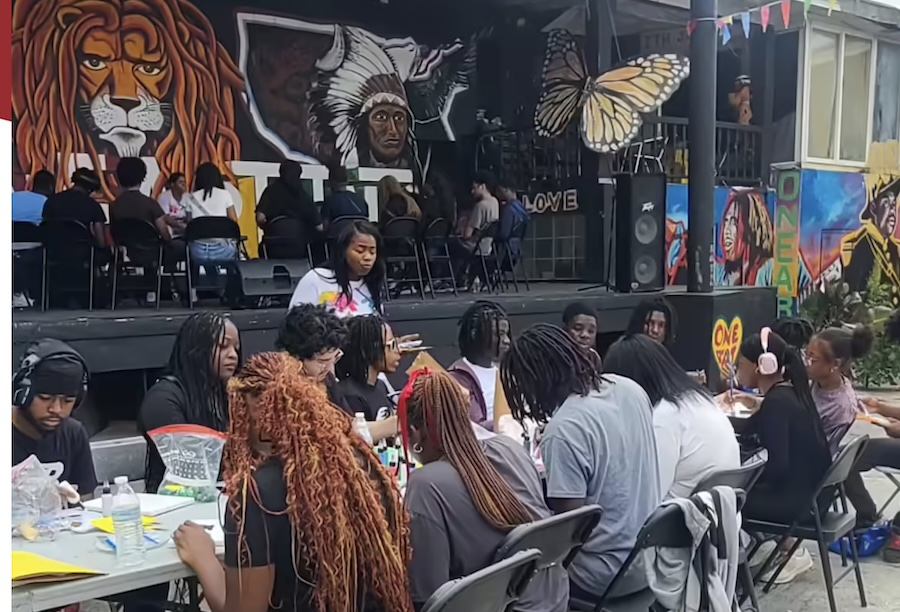
Peace Day Philly at One Art Community Center
(Survey continued from left column)
KANSAS
LAWRENCE: The Lawrence community is invited to the International Day of Peace celebration at Ecumenical Campus Ministries, where a local individual and an organization will be recognized for their contributions to promoting peace and justice. The evening’s featured speaker will be Rabbi Moti Rieber, executive director of Kansas Interfaith Action.
KENTUCKY
LOUISVILLE: Chalk It Up For Peace – Celebrating International Day of Peace. Saturday, Sept 21, 10:00 – 11:30am at All Peoples Unitarian Universalist Church. How can we cultivate a culture of peace? We invite kids of all ages (adults too!) to engage with artistic expression of what peace looks like, learn peacebuilding stories, and watch others building peace.
LOUISIANA
TAMMANY PARISH: Join us for a peaceful retreat to celebrate International Day of Peace with meditation, yoga, and mindfulness activities. Saturday, September 21 · 11:11am – 4:44pm, Bayou Paquet Road St Tammany Parish.
MAINE
UNITY: Peace Action Maine. Common Ground Fair in Unity, Maine hosts Peace Education music and speaker event on Saturday September 21st. Join us!
1:30-2:30pm Pihcintu Multinational Girls Chorus (ampitheater)
3:00-4:00pm Americans Who Tell the Truth – Rob Shetterly & Veterans for Peace Maine – Doug Rawlings (Social & Political Action speakers tent)
4:00-4:30pm Campaign Nonviolence – Rivera Sun (social action tent)
4:30-5:00pm Peace & Justice Center of Eastern Maine – Josh Kauppila (social action tent)
5:00-5:30pm World BEYOND War – Martha Morrison (social action tent)
MARYLAND
FREDERICK: Frederick Friends Meeting. We will hold a rally and peace walk Sept. 21, Saturday, at 2pm with the theme “Celebrating Peacemakers in our Community”.
MASSACHUSETTS
BOSTON: The UN International Day of Peace will be held in the sanctuary of The Cathedral Church of Saint Paul, 138 Tremont Street, Boston. This year’s theme is “Building a Culture of Peace”. The free program will feature peace education, music and more. Musical performers will include cellist Miranda Henne, Toussaint Liberator, and Lena Marcela Sarmiento Tellez, a Columbian singer and graduate of the Longy School of Music. Members of the FMC community (Friends Meeting of Cambridge) are involved in the organizing of the event and will be part of the program. This year’s program is dedicated to the memory of Ian Harrington and his countless years dedication to the cause of peace. After the program in the sanctuary at around 3:30pm, you are invited to walk to the nearby Garden of Peace for the closing.
BEVERLY
BRIDGEWATER
DUXBURY
FRANKLIN
LEVERETT
SPRINGFIELD
WESTON
MICHIGAN
MIDLAND: This Saturday marks the International Day of Peace and the advocacy group Nonviolent Peaceforce is kicking off a series of family-friendly events in Midland. The focus of the day is to encourage nations and individuals to resolve conflicts without violence. Nonviolent Peaceforce aims to inspire the Midland community through stage performances, the dedication of a “peace pole” and giveaways of a special book on fostering peace. Judy Timmons, treasurer and historian of Nonviolent Peaceforce Midland, underscored the commitment to resolving conflicts through dialogue rather than violence, especially in light of the many conflicts playing out on the world stage. ”We have to listen to one another before we can bring about peace.”
CANTON
LANSING
ROCHESTER
TRAVERSE CITY
MINNESOTA
MINNEAPOLIS: Please join Twin Cities Nonviolent, our partners, and the global community as we celebrate Twelve Days Free from Violence. This year, our schedule holds three categories of experiences for all to take part in including live, in-person and online events and suggestions for actions to promote peace.
– Saturday, Sept. 21, 4:00 – 5:00PM: Film Premier of “Hoodnomics”
– Saturday, Sept. 21, 11AM – 5PM: Open Streets West Broadway sponsored by OneMN.org and Seeds.
– Sunday, Sept. 22, 10:00AM – Noon: No School in Gaza, sponsored by Families Against Military Madness (FAMM). Family-friendly activities for children & educators w/ suggestions on student actions for a free Palestine.
– Sunday, Sept. 22, 11:00AM – Noon: A Peace Message with Father Harry Bury and Pastor Mike Williams at On Fire Ministry
– Sunday, Sept. 22, 3:30 – 5:00PM: Peace Concert with Jim ten Bensel and the Capri Big Band at On Fire Ministry
MISSISSIPPI
COLUMBUS: Catholic School hosts annual “Pinwheels for Peace” in Columbus, September 19, 2024. 187 students colored and shaped the pinwheels. They also wrote their thoughts or pictures about war and peace, tolerance, love, and living in harmony with others.
MISSOURI
INDEPENDENCE: On 21 September, Community of Christ will celebrate the International Day of Peace. The observance connects many aspects of peace that are part of discipleship: the dedication of the Temple in Independence, Missouri, the Daily Prayer for Peace; the Enduring Principle of Pursuit of Peace; and World Conference Resolution 1177, which encourages us to participate “with other organizations constructively promoting peaceful existence of humanity.”
NEBRASKA
LINCOLN: St. Mark’s United Methodist Church. September 25, 6:30 p.m. for an evening of prayer in observance of the International Day of Peace.
NEVADA
LAS VEGAS: In honor of September’s Classical Music Month and the International Day of Peace and World Gratitude (Sept. 21), JFSA Las Vegas will host an intimate concert featuring Violins of Hope at The Industrial, 2330 South Industrial Road, in Las Vegas, on September 21 at 7 p.m.
NEW HAMPSHIRE
DOVER: Dover Public Library, Saturday, September 21 · 10 – 11:30am. Come join a different kind of conversation – one that welcomes every perspective in a search for the underlying truths that unite us all – as we discuss the spiritual perspectives offered by the Bahá’í Teachings on what will be required to achieve true and lasting peace. Join us for a lively discussion as we explore the role each of us can play in bringing about humanity’s peace.
NEW JERSEY
MANCHESTER: Township’s Regional Day School students took time Friday to celebrate International Peace Day with a Pinwheels for Peace project, district officials said.
NEW MEXICO
LAS CRUCES: Peace Day provides a globally shared date for all humanity to commit to Peace above all differences and to contribute to building a Culture of Peace. Tune in to KTAL-LP throughout this Saturday to hear songs of peace from the KTAL-LP Music Library.
NEW YORK
UNITED NATIONS: On 21 September, United Nations Peacekeeping will commemorate the International Day of Peace with a series of live art installations, hosted at the UN Headquarters in New York and in peacekeeping missions around the world. The theme “Our Common Future is Peace,” taps into the power of street art to amplify voices from across the globe, promoting unity and collective action for peace. The campaign offers a platform for individuals to express their visions for a peaceful future, connecting with the themes of the upcoming Summit of the Future, which focuses on shaping a new global framework for peace. . . In New York, renowned American street artist Thomas Evans, better known as Detour, will lead Peace Day’s main artistic activation. Detour will create a large-scale mural on the theme “Building a Peaceful Future Together.” Spectators will have the chance to watch the mural unfold and contribute their own messages of peace on a second, collaborative canvas.
GENESEO
MANHATTAN, CODEPINK
MANHATTAN, PAX CHRISTI
MANHATTAN, TIMES SQUARE
OLEAN
ROCHESTER
NORTH CAROLINA
RALEIGH: William Peace University will take part in celebrating the International Day of Peace Sept. 21, 2024. WPU’s celebration includes a series of events starting Sept. 17 with the men’s soccer game versus Roanoke College at WakeMed Soccer Park. The game will be part of the One Day One Goal event. On Peace Day, One Day One Goal uses games to rise above their differences to resolve conflict or strengthen a fragile peace. One Day One Goal teams are typically made up of mixed players from different backgrounds who usually don’t get a chance to interact often. WPU will then host a community gathering on Sept. 23 beginning at 3 p.m. The event includes a presentation of artwork, a band, dancing, guest speakers, and multiple tabling stations, including one where students will plant a seed. The seed planting is part of the cultivating theme. There will also be a dinner afterward.
ASHEVILLE
CHARLOTTE
GREENSBORO
WAYNESVILLE
OHIO
GRANVILLE: Granville Girl Scout Brownie Troop 7627 is celebrating International Peace Day on Sept. 21-22 in the village’s Opera House Park. The Girl Scouts are making pinwheels as part of Pinwheels for Peace. The Brownies’ pinwheels will be on display in Opera House Park on Sept. 21-22.
AKRON
LAKEWOOD
OXFORD
PUT-IN-BAY
TIFFIN
OKLAHOMA
MIDWEST CITY: Oklahoma City Brahma Kumaris. September 16 · 7:45pm – September 20 · 8:45pm CDT -Learn to Meditate – a 5 days Free course – in person or online
OREGON
SALEM:International Day of Peace
Celebrating in Song, Dance and Readings, Saturday, September 21, 2024 3:00 PM, Salem Peace Plaza next to Library, sponsored by Bahais of Salem.
BEAVERTON
COTTAGE GROVE
ESTACADA
EUGENE
MILWAUKIE
NEWBURG
PORTLAND
PENNSYLVANIA
PHILADELOPHIA: First initiated in 1984, World Peace Day is in its 40th year of celebration. This year’s theme was ‘Cultivate a Culture of Peace.’ Founded in 2012, Peace Day Philly continues this tradition by curating demonstrations of peace around the city of Philadelphia in the lead-up to International Peace Day, observed annually on September 21st. Each year the program has expanded, and 2024 was no exception. Among many of the events to choose from was a Back-to-School mental health fair hosted by WeLovePhilly and a literacy fair, produced in collaboration with House of Umoja’s Peace LIT! . . . Overall, the event emphasized community wholeness. What struck me were the diverse reasons people gathered that day. For many, Peace Day Philly as an official event was unknown, but experiencing it was a unifying experience. House of Umoja and WeLovePhilly showed us peace is mightier than the sword. Regardless of our motivations for attending, a culture of peace was cultivated and the sense of community was undeniably magical. (see photo above)
EVANS CITY
NORTH PARK
PITTSBURGH
SCRANTON
WEST CHESTER
ZELIENOPLE
RHODE ISLAND
WESTERLY: Westerly Area Peace and Justice will host their 7th Annual International Day of Peace interfaith prayer service on Saturday, September 21, 2024 on the Esplanade in Wilcox Park starting at 6 pm.
SOUTH CAROLINA
GREENVILLE:International Day of Peace. Greenville, SC Baha’i Community. Come and join us for a fun-filled evening!
TENNESSEE
OAK RIDGE: Saturday, September 21, 2024. Oak Ridge girl scouts will have a program consisting of songs and peace readings to observe the UN international day of peace.
TEXAS
SAN ANTONIO: University of the Incarnate Word. Join us in Our Lady’s Chapel as we commemorate the 25th anniversary of the United Nations General Assembly’s adoption of the Declaration and Programme of Action on a Culture of Peace. This year’s theme is “Cultivating a Culture of Peace.”
UTAH
CEDAR CITY: You are invited to attend a concert honoring the life of Helen Foster Snow, Utah’s most famous humanitarian, industrial organizer, and journalist. Born in Cedar City in 1907, Helen was nominated twice for the Nobel Peace Prize for initiating the Gung Ho Movement in Asia, a program which provided financial aid for refugees to establish industrial cooperatives in the 1930’s. . . In celebration of the International Day of Peace, a concert featuring local students and musicians will be held Saturday, Septmeber 21, 2024 at 4:00 pm at the Thorley Recital Hall on SUU Campus. Donations are welcome! All proceeds go towards Camp Gung Ho. The event is supported by the Family Support Center of Southwestern Utah, Fiddlers Canyon Elementary School, Southern Utah University and local musicians. Helen’s 6,000 photographs and 64 books and manuscripts are currently housed at the Harold B. Lee Library at BYU, as well as the Hoover Institution at Stanford University.
VERMONT
BURLINGTON: Established in 1981 by unanimous United Nations resolution, International Day of Peace represents a globally shared day for all humanity to commit to building a culture of peace in communities around the world. The Vermont Council on World Affairs is excited to once again celebrate International Day of Peace with programming focused on this important topic. This year’s event, Peace in Progress: Understanding Today, Shaping Tomorrow, will focus on the future of peace and will explore our current global peace landscape and envision future pathways to a more unified world. During this event, we will unite advocates, visionaries, and policymakers who are committed to the shared commitment of building a more peaceful and secure world.
VIRGINIA
CHATHAM: Chatham Hall will celebrate the International Day of Peace with a special service in the Peace Garden. Led by Chaplain Barksdale, the event will feature a procession of flags from around the world, carried by community members representing their home countries, and an invocation by the President of the International Student Association. Together, we will gather in reflection, song, and prayer, offering a moment of unity and peace. Highlights include readings by students from the Model UN Club, planting flower bulbs to symbolize peace, and a communal prayer for nonviolence.
WASHINGTON
TACOMA: Tacoma Sister Cities presents the International Day of Peace.
The event will take place on Saturday, September 21st, 2024 from 11am to 1pm.
Cultivating a culture of peace is the focus of the event. There will be music, peaceful actions, inspirational speakers, and a moment of silence for global peace. The event will be held at Thea’s Park, located at 405 Dock Street in Tacoma, Washington.
WEST VIRGINA
BUCKHANNON: Students at Buckhannon-Upshur Middle School soon will be celebrating the International Day of Peace by displaying pinwheels symbolizing what peace means to them. This is part of a larger “Whirled Peace Day” initiative happening across the world. Art students will spend the coming days learning about several artists, as well as art techniques they can utilize when creating their own pinwheel, said Sherri Butler, a 7th grade art teacher.
WISCONSIN
MILWAUKEE: 9/21 – Milwaukee’s Peace Day activities will involve Indigenous-led ceremonies in the morning, a Peace Walk along Lake Michigan, a Palestinian lunch and more.
More details can be found at these links:
– Facebook Event
– Poster
APPLETON, BELOIT, EAU CLAIRE, FOND DU LAC, MADISON, RACINE, VIROQUA
